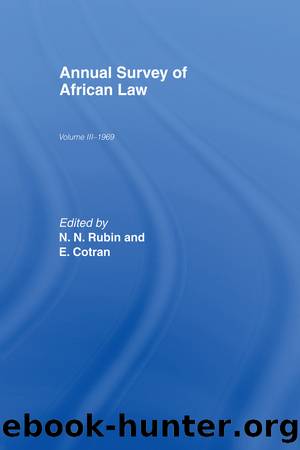Annual Survey of African Law Cb by Cotran E.;Rubin N. N.;Rubin. ;

Author:Cotran, E.;Rubin, N. N.;Rubin.,;
Language: eng
Format: epub
ISBN: 1782414
Publisher: Taylor & Francis Group
CONTRACT
In Springvale Lid. v. Edwards, 1969 (1) S.A. 464 (A.D.), the question of the extent to which a term should be implied into a contract was considered in a context in which other civil law systems would probably have approached the comparatively simple problem of this case through the doctrine of culpa in contrahendo. The facts which were not in dispute may be summarised as follows: In 1962 the defendant entered his son on the waiting list of the private school conducted by the plaintiff. He then received a prospectus which contained a reservation which gave the plaintiff the right to alter and increase its fees â then ammounting to £270 per annum â by giving one termâs notice. Conversely, parents of pupils at the school had the right to remove their children from the school by giving one termâs notice on the first day of each term. During the first term in 1965 the plaintiff offered the defendant a place at the school as from the first term in 1966. This offer was accepted in March 1965 and the defendant acknowledged in writing that the fees for the first term 1966 would be payable, unless a termâs notice in writing was given. Meanwhile the plaintiff increased the amount of its annual fees from £270 to £300. It is not quite clear whether that increase was announced before or after the defendant had accepted the place offered to his son, but it was not disputed that when he accepted that place, he bona fide believed that the fees were still £270 per year. In October 1965 the defendant âcancelledâ his acceptance. By then, the third term of 1965 had begun and it was, therefore, impossible for the defendant to give one termâs notice for the first term in 1966. He justified his cancellation on the ground that the plaintiff had failed to advise him of the increase in fees and that a notification to this effect should have been given either when he accepted the place or as soon thereafter as the increase had been decided upon. The plaintiff refused to accept this explanation and sued the defendant for payment of the fees for the first term of 1966. It must be assumed that the defendant cancelled the contract as soon as he learnt of the increase in fees. The court refused to imply a term imposing on the plaintiff the obligation to advise the defendant of the increase in fees because it would involve an alteration of the express provision requiring only âone termâs noticeâ of an increase in fees. In the circumstances, the court thought that clearly there was no basis for implying such an alteration. One cannot help wondering to what extent the fact that the increase in fees was comparatively small influenced the decision. It was pointed out that the defendant knew when he accepted the offer of a place that he was contracting to pay the current fees and he also knew that these were subject to alteration.
Download
This site does not store any files on its server. We only index and link to content provided by other sites. Please contact the content providers to delete copyright contents if any and email us, we'll remove relevant links or contents immediately.
| Africa | Americas |
| Arctic & Antarctica | Asia |
| Australia & Oceania | Europe |
| Middle East | Russia |
| United States | World |
| Ancient Civilizations | Military |
| Historical Study & Educational Resources |
Goodbye Paradise(3799)
Men at Arms by Terry Pratchett(2832)
Tobruk by Peter Fitzsimons(2508)
Borders by unknow(2303)
Arabs by Eugene Rogan(2292)
Pirate Alley by Terry McKnight(2218)
More Than Words (Sweet Lady Kisses) by Helen West(1860)
Belonging by Unknown(1854)
It's Our Turn to Eat by Michela Wrong(1726)
The Biafra Story by Frederick Forsyth(1653)
The Source by James A. Michener(1602)
Botswana--Culture Smart! by Michael Main(1598)
Coffee: From Bean to Barista by Robert W. Thurston(1542)
A Winter in Arabia by Freya Stark(1534)
Gandhi by Ramachandra Guha(1528)
The Falls by Unknown(1520)
Livingstone by Tim Jeal(1482)
The Shield and The Sword by Ernle Bradford(1402)
Africa: Altered States, Ordinary Miracles by Richard Dowden(1381)
